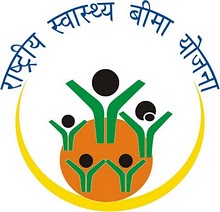Rashtriya Swasthya Bima Yojana
Rashtriya Swasthya Bima Yojana (RSBY) is a government-run health insurance scheme in India aimed at providing health insurance coverage to the below poverty line (BPL) families. Launched in 2008 by the Ministry of Labour and Employment, RSBY was designed to protect these families from financial liabilities arising out of health shocks that involve hospitalization. The scheme has been pivotal in facilitating access to quality medical care for the poor, thereby reducing their out-of-pocket expenditure on healthcare.
Overview[edit | edit source]
RSBY provides for cashless insurance for hospitalization in public as well as private hospitals. Each enrolled family under the scheme is entitled to coverage up to Rs. 30,000 per annum for most of the diseases that require hospitalization. The scheme covers five members of a family, including the head of the family, spouse, and up to three dependents. Beneficiaries under RSBY are issued biometric-enabled smart cards that are used to access health services and hospitalization benefits across the country.
Eligibility[edit | edit source]
The primary beneficiaries of RSBY are families that fall under the BPL category. The identification of these families is carried out by the state governments through a predefined criteria. Migrant workers and their families are also covered under RSBY, making it one of the few schemes to explicitly consider the health insurance needs of this marginalized group.
Implementation[edit | edit source]
The implementation of RSBY involves multiple stakeholders, including the central and state governments, insurance companies, and healthcare providers. The central government provides funding and guidance, while the state governments are responsible for the scheme's implementation at the ground level. Private and public insurance companies, selected through a bidding process, administer the insurance coverage. Healthcare providers are empaneled after meeting certain criteria set by the government, ensuring beneficiaries have access to a wide network of hospitals.
Impact[edit | edit source]
RSBY has been recognized for its innovative approach to providing health insurance to the poor. It has significantly increased the number of people with access to healthcare services, reducing their financial burden. Studies have shown improvements in the utilization of healthcare services among the enrolled families, indicating the scheme's effectiveness in achieving its objectives.
Challenges[edit | edit source]
Despite its successes, RSBY faces several challenges. These include issues related to the enrollment process, delays in the issuance of smart cards, fraud, and the quality of healthcare services provided. Ensuring the sustainability of the scheme, given its financial implications for the government, remains a critical concern.
Future Directions[edit | edit source]
The future of RSBY is geared towards expansion and integration with other health insurance schemes under the umbrella of the Ayushman Bharat program. This integration aims to create a more comprehensive health insurance ecosystem in India, addressing the needs of a broader population beyond the BPL families.
Search WikiMD
Ad.Tired of being Overweight? Try W8MD's physician weight loss program.
Semaglutide (Ozempic / Wegovy and Tirzepatide (Mounjaro / Zepbound) available.
Advertise on WikiMD
|
WikiMD's Wellness Encyclopedia |
| Let Food Be Thy Medicine Medicine Thy Food - Hippocrates |
Translate this page: - East Asian
中文,
日本,
한국어,
South Asian
हिन्दी,
தமிழ்,
తెలుగు,
Urdu,
ಕನ್ನಡ,
Southeast Asian
Indonesian,
Vietnamese,
Thai,
မြန်မာဘာသာ,
বাংলা
European
español,
Deutsch,
français,
Greek,
português do Brasil,
polski,
română,
русский,
Nederlands,
norsk,
svenska,
suomi,
Italian
Middle Eastern & African
عربى,
Turkish,
Persian,
Hebrew,
Afrikaans,
isiZulu,
Kiswahili,
Other
Bulgarian,
Hungarian,
Czech,
Swedish,
മലയാളം,
मराठी,
ਪੰਜਾਬੀ,
ગુજરાતી,
Portuguese,
Ukrainian
Medical Disclaimer: WikiMD is not a substitute for professional medical advice. The information on WikiMD is provided as an information resource only, may be incorrect, outdated or misleading, and is not to be used or relied on for any diagnostic or treatment purposes. Please consult your health care provider before making any healthcare decisions or for guidance about a specific medical condition. WikiMD expressly disclaims responsibility, and shall have no liability, for any damages, loss, injury, or liability whatsoever suffered as a result of your reliance on the information contained in this site. By visiting this site you agree to the foregoing terms and conditions, which may from time to time be changed or supplemented by WikiMD. If you do not agree to the foregoing terms and conditions, you should not enter or use this site. See full disclaimer.
Credits:Most images are courtesy of Wikimedia commons, and templates Wikipedia, licensed under CC BY SA or similar.
Contributors: Prab R. Tumpati, MD

